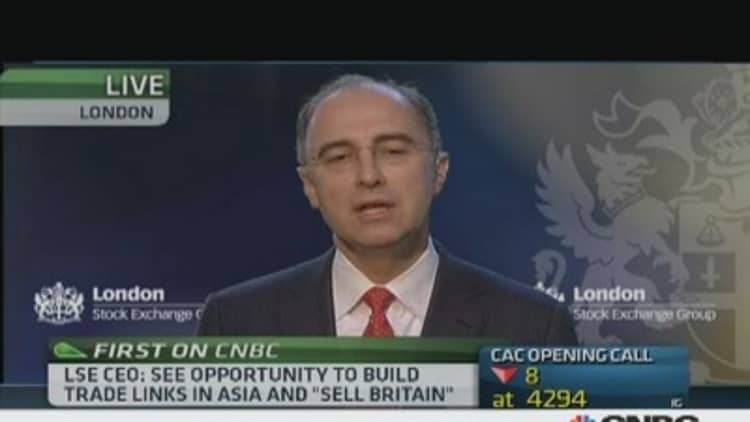
Small and medium enterprises (SMEs) have been fueling the economic recovery in the U.K. and the U.K. government has been trying to boost lending to the sector. But now the London Stock Exchange is getting in on the act, urging SMEs to look at raising equity instead.
According to the CEO of the LSE Group, Xavier Rolet, not enough SMEs used equities to fund their growth.
"The London Stock Exchange group today is a widely diversified group. SMEs represent less than one percent of our revenues," Rolet told CNBC in an interview on Friday.
(Read more: Funding for lending to focus on SMEs: Carney)
"What we can offer is additional funding options, and particularly non-debt based financing. If you're an entrepreneur, if you're going to borrow money, you have to pay interest, very often you have to mortgage some assets. This is not the case with equity investors."
The LSE has identified 1,000 SMEs that will help propel the British economy through a report by Growth Intelligence titled "1,000 Companies to Inspire Britain," which details the most vibrant, fast-growing companies in the country.
(Read more: James Caan to host business series on CNBC to help SMEs)
Rolet told CNBC that 50 percent of SMEs use credit cards to fund themselves, and that only three percent currently tap into the equity market for funding.
"Equity investors have unlimited upside, but they also take the downside," Rolet said. "So what we're arguing and promoting is a wider range of options so that these entrepreneurs, these SMEs, can also diversify their sources of funding."
"These are innovative companies, some of them are quite small, some of them are well known, Wallace & Gromit, Aardman productions, for example. Many of them actually operate in the manufacturing economy, or technology, which is another under-reported success story of the U.K. economy."
According to Rolet, there was an industrial-technology movement taking place in the U.K. with over 20 percent of the 1,000 SMEs in the LSE report coming from the manufacturing sector, while 20 percent were from high tech.
(Read more: The Business Class: Breaking SME boundaries)
On Thursday, the Bank of England announced that it would focus its Funding for Lending scheme on small firms that were finding it hard to borrow.
"A lot of people ask us: 'Why have you been bullish on the U.K. economy for well over a year?' The U.K.economy is creating more than 15,000 good-paying jobs every month, new jobs. This is where they are coming from," Rolet said.
One attraction for equity issuers could be the performance of small cap stocks listed in London. The FTSE SmallCap Index has rallied 26 percent so far this year, compared to just 13 percent for the large-cap FTSE 100 Index.

